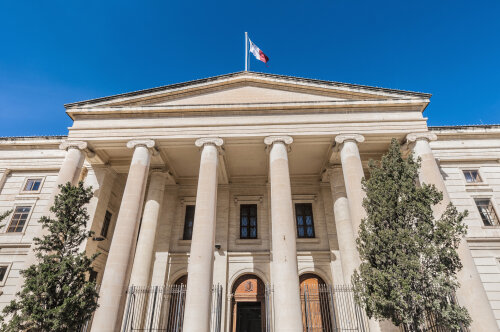Best Faith-Based Law Lawyers in Birkirkara
Share your needs with us, get contacted by law firms.
Free. Takes 2 min.
List of the best lawyers in Birkirkara, Malta
About Faith-Based Law in Birkirkara, Malta
Faith-Based Law in Malta, including in Birkirkara, often involves principles that are drawn from religious doctrines and texts. These laws can intersect with civil law in various personal matters such as marriage, divorce, family disputes, and the administration of religious inheritance. While Malta is a predominantly Catholic country, the practice and influence of Faith-Based Law reflect the diverse religious landscape present within the community. Legal professionals in this field address issues that might arise where religious beliefs and legal requirements intersect.
Why You May Need a Lawyer
There are several circumstances under which individuals in Birkirkara might need legal assistance in the domain of Faith-Based Law. These include:
- Religious marriage and divorce proceedings, especially when dealing with interfaith marriages.
- Resolving disputes over inheritance matters that include religious considerations or stipulations.
- Navigating situations where religious and civil obligations may conflict, such as in cases of religious dress in workplaces or schools.
- Seeking advice for religious organizations on compliance with both religious doctrines and local regulations.
- Assisting in the creation of faith-based community initiatives that align with Maltese law.
Local Laws Overview
In Birkirkara, as in the rest of Malta, the legal system is a mixture of civil law and principles grounded in religious traditions. Key aspects relevant to Faith-Based Law include:
- The Marriage Act, which governs civil marriage and recognises religious marriages, subject to compliance with registration requirements.
- The Civil Code, relating to personal status and family law, where religious customs may sometimes influence legal proceedings.
- Regulations concerning religious discrimination in employment and education, ensuring respect for religious practices.
- Procedures for religious organizations to gain legal status and the associated responsibilities under Maltese law.
Frequently Asked Questions
1. What is Faith-Based Law?
Faith-Based Law refers to legal principles that are influenced by religious beliefs and traditions. In Malta, it often intersects with statutory law in personal and family matters.
2. Can Faith-Based Law override civil law in Malta?
No, Maltese civil law prevails over any religious law. However, the courts may consider religious principles in family law matters when relevant.
3. Does Malta recognize religious marriages?
Yes, Malta recognizes religious marriages provided they meet the civil registration requirements enforced by the state.
4. How can a lawyer help with Faith-Based Law issues?
A lawyer can help navigate conflicts between religious law and secular law, provide representation in disputes, and offer advice on compliance with legal obligations.
5. Can religious dictates be used in court for family disputes?
Religious beliefs may informally influence proceedings, particularly in family law, but secular law will ultimately guide court decisions.
6. Are there specific laws for different religions in Malta?
Maltese law does not differentiate between religions but seeks to respect religious practices within the context of national law.
7. How does Faith-Based Law affect divorce in Malta?
While civil divorce is regulated by Maltese law, lawyers can assist in balancing religious views about marriage dissolution with legal procedures.
8. What role do religious tribunals play in Malta?
Religious tribunals may address ecclesiastical matters or issues of internal religious significance but have no civil legal authority.
9. Are there legal protections for religious dress in Malta?
Yes, Maltese law provides protections against discrimination based on religion, which extends to religious attire in workplaces and public settings.
10. How can religious organizations achieve legal recognition in Malta?
Religious organizations must register with the appropriate state authority to gain legal status and comply with both religious and national regulations.
Additional Resources
For those seeking more information or legal assistance, the following resources might be useful:
- Public Registry of Malta - for information on marriage registration.
- The Ministry for Justice, Culture, and Local Government - for guidance on faith-based legal issues.
- The Malta Law Courts - where one can seek resolutions for disputes under Maltese jurisdiction.
- The Commission for the Rights of Persons with Disability (CRPD) - for issues relating to religious discrimination.
- Various religious bodies and representatives who provide counsel on religious obligations.
Next Steps
If you find yourself in need of legal assistance on Faith-Based Law matters in Birkirkara, follow these steps:
- Identify the specific nature of your legal concern and gather all relevant documentation.
- Research and consult with lawyers who specialize in Faith-Based Law in Malta to understand your options.
- Contact legal firms or individual practitioners to schedule consultations and seek advice on your case.
- Prepare questions and seek clarification on any complexities to make informed decisions.
- Consider reaching out to local religious leaders if your issue involves ecclesiastical principles.
These steps will help you navigate the intersection of faith and law effectively, ensuring your rights and obligations are respected both legally and religiously.
Lawzana helps you find the best lawyers and law firms in Birkirkara through a curated and pre-screened list of qualified legal professionals. Our platform offers rankings and detailed profiles of attorneys and law firms, allowing you to compare based on practice areas, including Faith-Based Law, experience, and client feedback.
Each profile includes a description of the firm's areas of practice, client reviews, team members and partners, year of establishment, spoken languages, office locations, contact information, social media presence, and any published articles or resources. Most firms on our platform speak English and are experienced in both local and international legal matters.
Get a quote from top-rated law firms in Birkirkara, Malta — quickly, securely, and without unnecessary hassle.
Disclaimer:
The information provided on this page is for general informational purposes only and does not constitute legal advice. While we strive to ensure the accuracy and relevance of the content, legal information may change over time, and interpretations of the law can vary. You should always consult with a qualified legal professional for advice specific to your situation.
We disclaim all liability for actions taken or not taken based on the content of this page. If you believe any information is incorrect or outdated, please contact us, and we will review and update it where appropriate.










